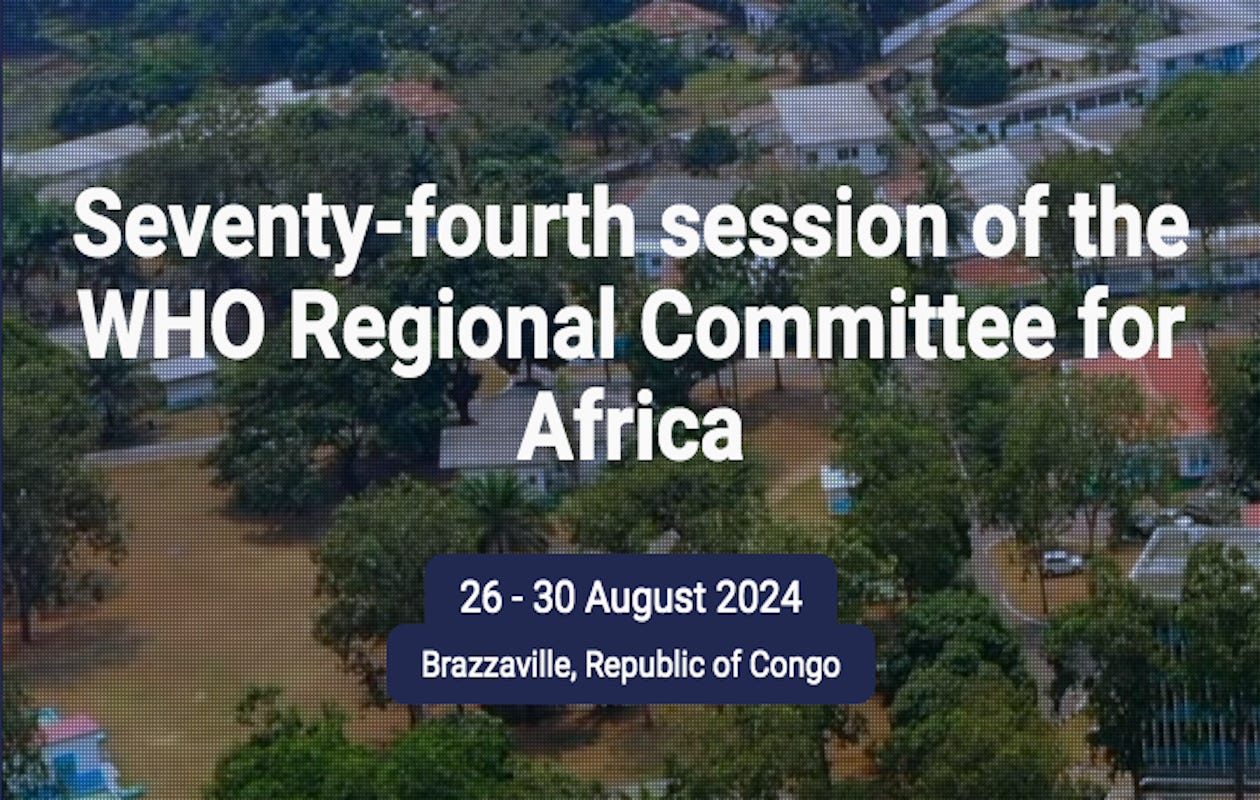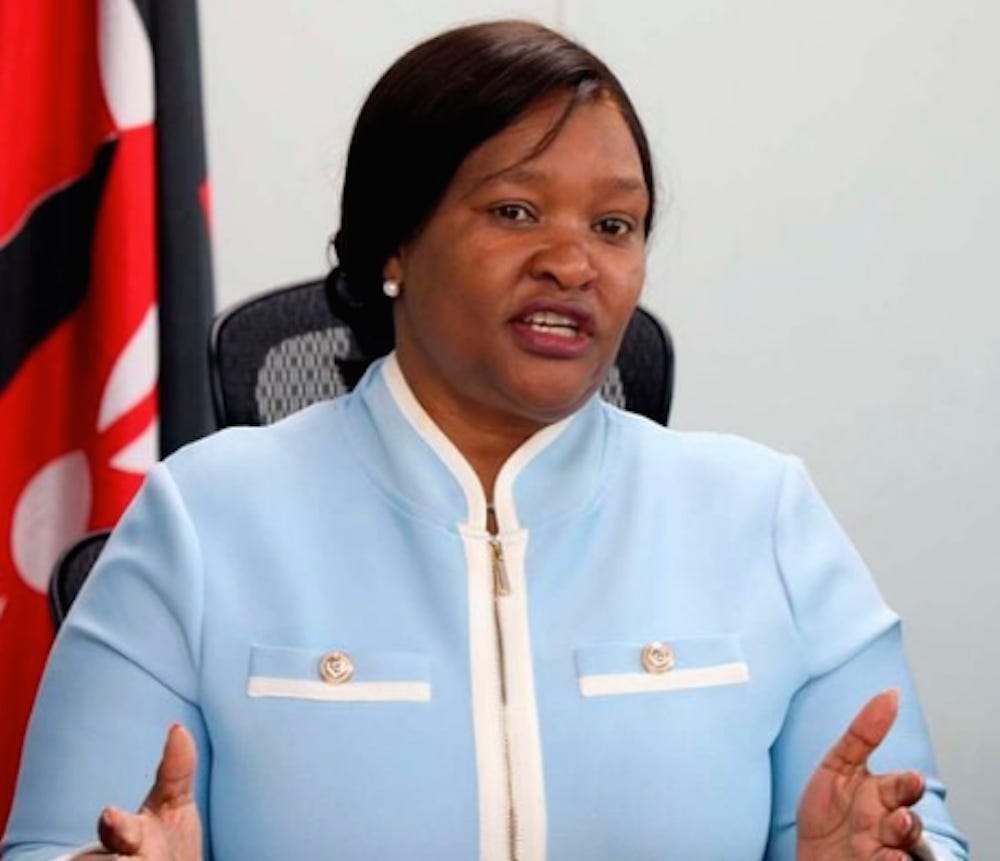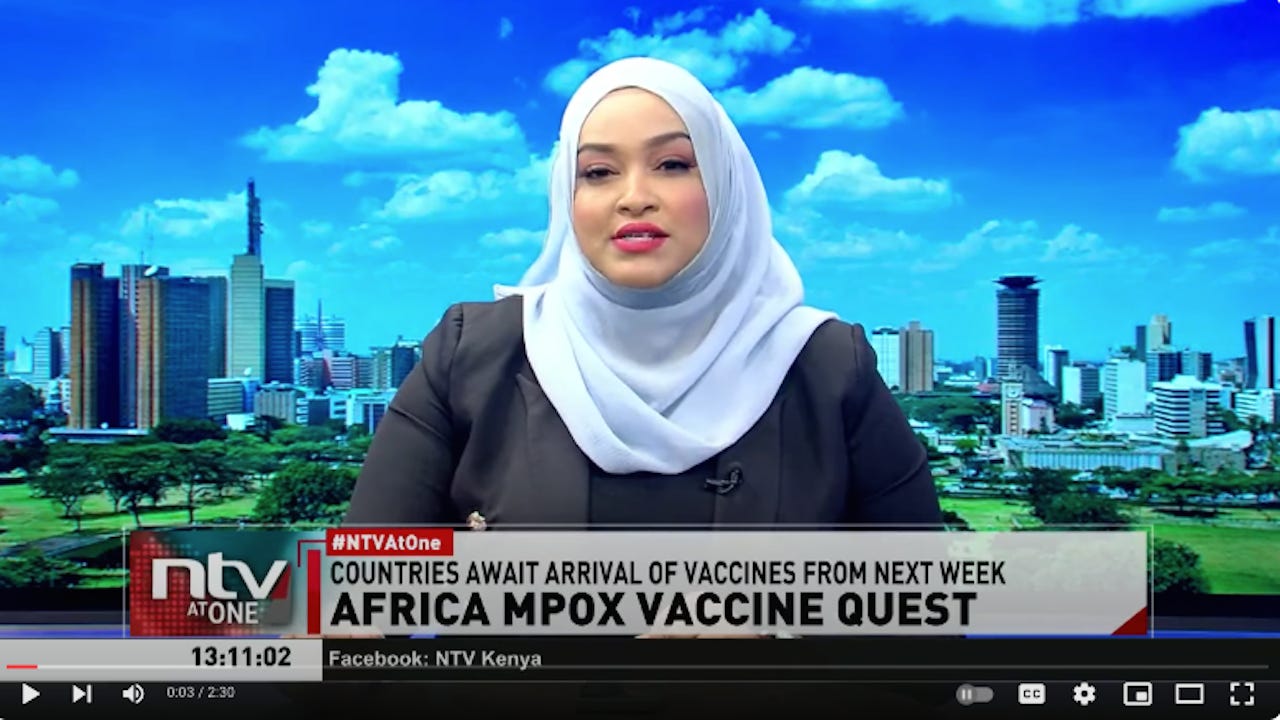The Pharmaceutical Hospital Emergency Industrial Complex (PHEIC) has set their sites on expanding their manufacturing capacity in Africa.
Their ultimate goal is to create "market certainty" by signing an “equity-based” Pandemic Treaty.
UPCOMING EVENTS:
August 26-30, 2024
The Seventy-fourth session of the World Health Organization’s Regional Committee for Africa is scheduled to meet in Brazzaville, Republic of Congo (not the Democratic Republic of the Congo).
September 2-6, 2024
The WHO has scheduled “interactive dialogues and outreach to provide balanced and diverse expertise, viewpoints and perspectives” that may be live streamed and recorded September 2-6, 2024. VIDEOS TO BE AVAILABLE HERE
Topics are to include the following:
Article 4 (Pandemic prevention and surveillance)
Article 5 (One Health approach for Pandemic Prevention, Preparedness and Response)
Article 12 (Pathogen Access and Benefit-Sharing System)
The legal architecture of the proposal for the WHO Pandemic Agreement
September 9-20, 2024
The next round of negotiations for the proposed “Pandemic Treaty” are scheduled for September 9-20, 2024. DETAILS AVAILABLE HERE
The latest version of the Pandemic Treaty is available HERE.
Framework for strengthening local production of medicines, vaccines and other health technologies in the WHO African Region 2025-2035
There are 649 pharmaceutical manufacturing plants in Africa, with 29 [of the 54] countries having varying drug manufacturing capabilities.
In the African Region, between 70% and 100% of medicines and other medical products, 99% of vaccines, and between 90% to 100% of medical devices are imported, with very limited or no manufacturing capacity for active pharmaceutical ingredients (APIs), drug substances for vaccines, and medical devices.
In comparison, China and India have roughly the same population as the African Region and have 5,000 and 10,500 drug manufacturers, respectively.
There is strong leadership and political commitment for the establishment and scale-up of local production.
WHO continues to support Member States to establish and scale up local production.
In addition, access to technology transfer is facilitated through the mRNA vaccine technology transfer hub supported by WHO and its partners and located within Afrigen Biologics and Vaccines, Cape Town, South Africa, and the WHO Biomanufacturing Workforce Training Initiative.
Goal: Increased market share of locally produced medical products in the African Region
Governments to support local industry to ensure that by 2035:
(a) Market share of locally produced medical products reaches 55%.
(b) At least 50% of vaccine doses needed are manufactured in Africa.
Improving health financing strategies in the context of universal health care to create market certainty.
KENYA
Kenya to start Mpox vaccination
As part of the response measures to control the outbreak and prevent new cases, Cabinet Secretary for Health Debora Barasa said the ministry had intensified surveillance activities across the country, activated the public health emergency operations centres and established incident management teams across the country.
Dr. Barasa in her first press briefing at the helm of the ministry announced that the Mpox risk of infection in the country remains low. She revealed that the country’s surveillance has picked up about 31 suspected cases, 29 of which have tested negative.
Last week, the ministry announced that a 42-year-old man who was Kenya’s first Mpox case has now recovered.
Kenya is one of five African countries set to receive 50,000 doses of the Mpox vaccine as part of an international effort to prevent the transmission of the disease. The donation is being made by Emergent BioSolutions through Direct Relief, a humanitarian organisation, in partnership with the World Health Organization (WHO) and the US government.
Other countries receiving doses are the Democratic Republic of Congo (DRC), Burundi, Rwanda and Uganda. The ACAM2000 vaccine is intended primarily for use in a bioterrorism emergency and is indicated for active immunisation against smallpox disease in persons at high risk of smallpox infection.
In a statement to newsrooms, Dr. Githinji Gitahi, chief executive for Amref Health Africa, said that…
the outbreak is a reminder to the global community that there is an urgent need to finalise and sign an equity-based Pandemic Treaty.
https://www.theeastafrican.co.ke/tea/science-health/kenya-to-start-mpox-vaccination-4733186
PREVENTIVE SURVEILLANCE:
Kenya on high alert after second case of Mpox
The Ministry of Health on Friday confirmed a second case of Mpox in Kenya, sparking renewed concerns about the spread of the disease within the country.
The second patient is also a male truck driver. He was screened at the Malaba One Stop Border Post in Busia county, Health CS Deborah Mulongo said in a statement.
The patient, who has a history of travel to the Democratic Republic of Congo, an area currently battling a significant Mpox outbreak, is now in isolation and receiving treatment at a health facility in Busia.
The announcement comes nearly a month after Kenya reported its first case of Mpox on July 31, 2024.
"Since the declaration of the first case of Mpox, 28 contacts of the said case have completed a 21-day follow-up period without developing symptoms. They have been discharged from active follow-up," the CS said.
The ministry noted that 42 samples have been submitted for Mpox testing, with 40 samples returning negative results.
Additionally, 426,438 travellers have been screened at various ports of entry across the country since the onset of the outbreak.
On Monday, Health director general Patrick Amoth said Kenya will receive 2 million doses from the Denmark-based Nordic manufacturing company by December.
“But the vaccine will not be for everybody because of the scarcity in terms of availability. We will prioritise the population to be put at the forefront,” Amoth said.
https://www.the-star.co.ke/health/2024-08-24-kenya-on-high-alert-after-second-case-of-mpox/
ONE HEALTH APPROACH:
Mpox: Tourism Cabinet Secretary Miano urges Kenyans not to eat bush meat
Tourism and Wildlife Cabinet Secretary Rebecca Miano has appealed to Kenyans to desist from handling or consuming bushmeat with immediate effect in wake of the Mpox threat, with Kenya having confirmed its second case on Friday.
Ms. Miano said that although reported cases are isolated, the prevailing situation may spread if Kenyans fail to heed cautionary counsel from experts.
Medical and animal health experts say Mpox is a zoonotic viral disease that is communicable between wild animals and human beings.
Ms. Miano said the main root cause of the spread of the disease involves interaction among human beings, livestock and wild animals.
“In this day and age of dire consequences of extreme climate change ebb and flow, host-vector-pathogen dynamics are likely to result in unprecedented disease emergence and re-emergence, I urged Kenyans to stay away from bushmeat,” said the Cabinet Secretary.
https://nation.africa/kenya/news/mpox-tourism-cs-miano-urges-kenyans-not-to-eat-bush-meat-4737868
Please watch the video below:
https://www.youtube.com/watch?v=NyS5vZUVeNM
“The medicines they are giving him are working?”
What medicines are they using??????
Why mpox vaccines are only just arriving in Africa after two years
The country currently hardest hit by mpox is [the Democratic Republic of the] Congo. Since January 2023, there have been more than 27,000 suspected cases and 1,100 deaths there, according to government figures, mainly among children.
But the first 10,000 vaccines donated by the United States are not destined for Congo but for Nigeria, as a result of several years of talks between both governments. Nigeria has had 786 suspected cases this year, and no deaths.
The U.S. Agency for International Development (USAID) said it has also donated 50,000 doses to Congo, but the arrival date is not yet finalized.
https://nation.africa/kenya/news/africa/why-mpox-vaccines-arriving-in-africa-after-two-years-4738110
United States Response to the Clade I Mpox Outbreak in Several African Countries
From August 2022 to August 2024, the Administration for Strategic Preparedness and Response (ASPR), part of the Department of Health and Human Services (HHS), distributed more than one million vials of the JYNNEOS vaccine across the United States to mitigate the spread and severity of the clade II mpox outbreak. Those who have already had clade IIb mpox or who are fully vaccinated against it are expected to be protected against clade I mpox.
CDC has issued an updated Health Alert Network advisory for clinicians and public health departments and partners, as well as an updated Travel Health Notice, recommending travelers to DRC and neighboring countries to practice enhanced precautions. Through the State Department, our embassies are working to keep U.S. citizens abroad informed of these updates. At this time, CDC and WHO do not discourage travel to DRC or elsewhere due to the mpox outbreaks.
The U.S. government support for the mpox response builds on our longstanding partnerships in global health security and development with DRC [253 KB] and throughout Africa.
Since March 2024, USAID and CDC together have provided an additional $20 million USD to support clade I mpox response efforts in Central and Eastern Africa, and on August 20, USAID announced up to an additional $35 million in emergency health assistance to bolster response efforts, pending Congressional Notification, bringing the proposed total U.S. government financial support for DRC and other affected countries in the region to more than $55 million.
In addition to direct financial support, the United States government is surging staff to support the mpox response. More than 200 staff including epidemiologists, laboratorians, and risk communication experts have been deployed to support response efforts in the United States and Africa. United States government support has focused on a range of critical public health interventions aimed at limiting transmission and reducing mpox morbidity and mortality.
These interventions include surveillance with deployment of additional local field epidemiologists, risk communication and community engagement, laboratory supplies and diagnostics, infection prevention and control, clinical services, and vaccine planning.
In addition to scaling up surveillance, testing, and treatment of cases, vaccination will be a critical element of the response to this outbreak.
To support this effort, USAID is donating 50,000 doses of the FDA-approved JYNNEOS vaccine to DRC, as well as financial support for rollout of the vaccine doses.
Traveler Information
Health Information for Travelers to Central African Republic
Health Information for Travelers to the Democratic Republic of the Congo
James Roguski
310-619-3055
JamesRoguski.substack.com/archive
All content is free to all readers.
All support is deeply appreciated.
















MONEYPOX! All those WHO/WEF control freaks, BUGGER OFF AND LEAVE US ALONE!
Hell with the hypochondria germaphobia fear hysteria monkeyshines driving us all ape! RESIST! DO NOT CONSENT BEFORE WE ALL GO BANANAS!
SERIOUSLY FOLKS! KEEP FIGHTING! Can't say this often enough! The WHO/UN/WEF are totally criminal entities that must be litigated and dismantled off the face of the earth and its upper level employees tried and jailed. Nothing THE WORLD HELL ORGANIZATION does has any legitimacy.
EQUITY is Orwellian doublespeak for equal ENSLAVEMENT of us proles under the technocratic parasitical malevolent rule by control freak, power-mad psychos. The word EQUITY makes my blood boil whenever I hear it now that I understand its true meaning.
A vast majority of so-called leaders and Public 'Serpents' around the world have been bribed, blackmailed/coerced into serving the interests of their technocratic New World Ordure parasite masters and not We the People.
The world needs a lot more rejections of the UN/WHO's nefarious schemes.
So much admiration for Interest of Justice and James Roguski, may 2024 see the fruition of their indefatigable efforts and the defeat and dismantling (jailing?) of these noxious power-mad money-grubbers!
Reiterating for the sake of newbies and to support this post.
'The UN/WHO is a criminal organization that must be disbanded and prosecuted along with its individual members and member organizations to the full extent of the law.
There can be no negotiating with it or explaining to it beyond what is necessary to remove any records, assets, power, or immunities it has, and to pursue such criminal charges.'
Thanks to James Roguski for constantly reminding us about the insidious wickedness threatening us all, embodied in DEMENTED DOCUMENTS DEPLOYED by crooks and liars!
Apoplectic livid rage hardly describes the intensity of emotions I have had and am having over what these malignant parasites are perpetrating!
I DO NOT COMPLY! NEVER HAVE, NEVER WILL!
Too many 'sheeple' are brainwashed to blindly obey authority figures on the media or in daily life in corrupt system ruled by control freak psychopaths who use propaganda lies to enslave their subjects and they are dumbed down to be obedient by 'education' institutions. Fortunately I was raised to question everything. This transcends party lines. We need a system that punishes psychopaths and rewards compassion and sharing, we need a system that actually follows The Constitution in reality.
There is no noxious crime that the evildoers desiring to lord it over us won't commit to maintain their stranglehold on power. A groundswell critical mass resistance to their murderous enslavement plans is needed urgently!
May the UN/WHO and all its affiliate parasite scum be made to vanish from the face of the earth!
SCREW THE UN/WHO AND THE HORSE THEY RODE IN ON! They can stick their damned treaties, slave passports and IHR where the sun don't shine and if you follow the 'Early Treatment Protocols' and get plenty of regular exercise, which I do, you will never get sick!
We the People are facing HORRIFYING TECHNOCRATIC PSYCHOPATHY TO DESTROY HUMANITY AND ALL NATURAL LIFE!
Kudos also to James Roguski's heroic efforts and success in the struggle. We the People must always be aware of the existential threats lurking behind this fight!
Ban all vaccine jabs! There has never been a 'safe and effective' vaccine since Edward Jenner's fraud over 200 years ago as per 'Dissolving Illusions' by Suzanne Humphries and 'Turtles All the Way Down' by Anonymous. Health can never come from a needle or pills, but from healthy eating, healthy exercise and healthy living!
All manner of lies and propaganda spew forth from the upper echelons in governments worldwide who are completely intertwined with the global criminal ruling class that wants to commit the worst atrocities imaginable and suffer no consequences. And their corruption slithers down the chain of command creating petty tyrants everywhere.
Supporting this excellent post with a statement and useful links. RejectDigitalEnslavement.com
It was NEVER about health! The Powers That Should Not Be were ALWAYS about they want you DEAD or a SLAVE! This is a painful truth to accept but we the people must wake up and fight back!
We must never lose sight of the larger picture of the vile malignance we are fighting against.
CLIMATE CHANGE IS AN EVEN WORSE FRAUD THAN THE PLANSCAMDEMIC! SO-CALLED GREEN TECH IS A GIGANTIC SCAM! MINING AND MANUFACTURING 'GREEN' PRODUCTS NEEDS COAL, GAS AND OIL AND MINING RARE MINERALS IS MORE ENVIRONMENTALLY TOXIC AND DESTRUCTIVE THAN LEGACY PRODUCTS. SCREW YOUR DAMNED AGENDA! climateviewer.com
Migrant/Entrant Invasion/Infrastructure Attacks - all part of the destructive plot to achieve total slavery!
There is an insidious global ruling class plot to enslave all life on earth behind all the madness and suffering inflicted on We the People.
How to fight back against this TOTAL SLAVERY!
RESIST! DO NOT COMPLY! DITCH THE DAMNED 'SMART' PHONES AND THE DAMNED QR CODES AND GO BACK TO LANDLINES OR FLIP PHONES AND USE CASH AS MUCH AS POSSIBLE! INSIST ON CASH! CBDC IS TOTAL SLAVERY!
Other than getting rid of nuclear weapons which I support 100% the rest of the anti-nuclear peace movement and CLIMATE CRISIS propaganda is parroting UN utter GARBAGE, a complete surrender to the ENSLAVEMENT AGENDA by the diabolical despots of Davos - ruling class criminals who lust for total power and control and all of whom should be tried and jailed for life and their malign organizations dismantled: the UN, the WEF, the IMF, the WHO, the BIS, NATO, Blackrock, Vanguard, The Rockefellers, the Rothschilds, The Bilderbergers, the CFR et al.
There is an evil predator globalist technocratic elite agenda of eugenics/depopulation/genocide using bioweapon poison jabs, war, geoengineering, EMF radiation, starvation and economic collapse - THE GREAT RESET/AGENDA 2030/4TH INDUSTRIAL REVOLUTION to get rid of billions of 'useless eaters' and to use nano tech to turn the survivors into ROBOTIZED COMPLIANT SLAVES! WAKE UP AND RESIST! DO NOT COMPLY! These are psychopath megalomaniacs who want to play god by turning all life into digitized metaverse mechanistic synthetic biology to be manipulated by their AI algorithms. A more demonic sickening idea is nearly impossible to imagine!
APPALLED AND HORRIFIED AT INSANE TYRANNICAL PROTOCOLS THAT HAVE NOTHING TO DO WITH HEALTH AND EVERYTHING TO DO WITH TOTALITARIAN CONTROL! REVERSE THIS NOW!
MAKE THE WORLD AND AMERICA 2019 (comparatively speaking), AND FREE AGAIN!
NO, I AM NOT AFRAID OF THE MORONIC SCARIANT SHMARIANT MONKEYSHINES! WAKE UP ALREADY!
TOTALLY CONDEMN BIDEN AND ALL OTHER POLS WHO HAVE NO POWER TO LAWLESSLY ACT LIKE AN EMPEROR OR DICTATOR AND DECREE JAB CROW 'SHOW ME YOUR PAPERS' FASCIST SEGREGATION/DISCRIMINATION/APARTHEID VIOLATIONS OF THE CONSTITUTION, THE NUREMBERG CODES AND EVERY CIVIL RIGHT IMAGINABLE.
NO GREEN NEW DEALS OR BUILD BACK BETTER FROM THE CRIMINAL TECHNOCRAT TYRANTS KLAUS SCHWAB AND HIS CRONIES FROM THE WORLD ECONOMIC FORUM.
STOP THE TERRIBLE TYRANNY OF THE TECHNOCRATS GLOBAL AGENDA OF TOTAL SURVEILLANCE AND CONTROL USING THE VIRUS AS EXCUSE AND PROPAGANDA TOOL!
NO MUZZLING STIFLING MASK MANDATES! NO FORCED VACCINES! END TORTUROUS DEVASTATING LOCK DOWNS NOW! I WANT MY LIFE BACK.
https://virustruth.net
https://wrenchinthegears.com
https://www.stopworldcontrol.com/
https://www.thelastamericanvagabond.com
https://pandemicfacts.info
https://wearehumanwearefree.org/7-days-campaign/
https://sonsoflibertymedia.com/covid-19-roadmap-12-step-plan-to-create-a-totalitarian-new-world-order-were-on-number-8-headed-towards-number-9/
https://questioningcovid.com
https://www.corbettreport.com/interview-1581-james-corbett-breaks-down-the-great-reset/
http://www.stopcp.com/GlobalResetPSYOP/GlobalResetPSYOPMindMap.html
https://everydayconcerned.net/2020/09/04/breaking-major-investigative-report-by-association-of-french-reserve-army-officers-finds-covid-19-pandemic-to-have-a-hidden-agenda-for-global-totalitarianism-nanotech-chipping-of-all-5g-irradia/
Pam Popper: https://makeamericansfreeagain.com
Del Bigtree: https://www.brighteon.com/channels/highwire
https://www.technocracy.news
Naomi Wolf: https://dailyclout.io
www.nojabforme.info
https://www.globalresearch.ca/we-must-awaken-from-corona-coma-reject-great-reset-robotic-technocracy-assert-common-humanity/5745213
Their ‘news’ reads like satire, it truly does. Oh it’s deadly but has no symptoms or has recovered fully or whatever. Of course these African Governments are well aware which side their bread is buttered on and will gladly tell a few yarns to collect the cash. I have travelled extensively through Africa and when millions are living on top of each other in cities like Nairobi, Dar, Kinshasa with a deficiency of basic water / sewage treatment then of course there will be illness - soooo, let’s call it AIDs or MPox and get a wad of cash and stick needles into the uneducated. Yes, that should do the trick☘️